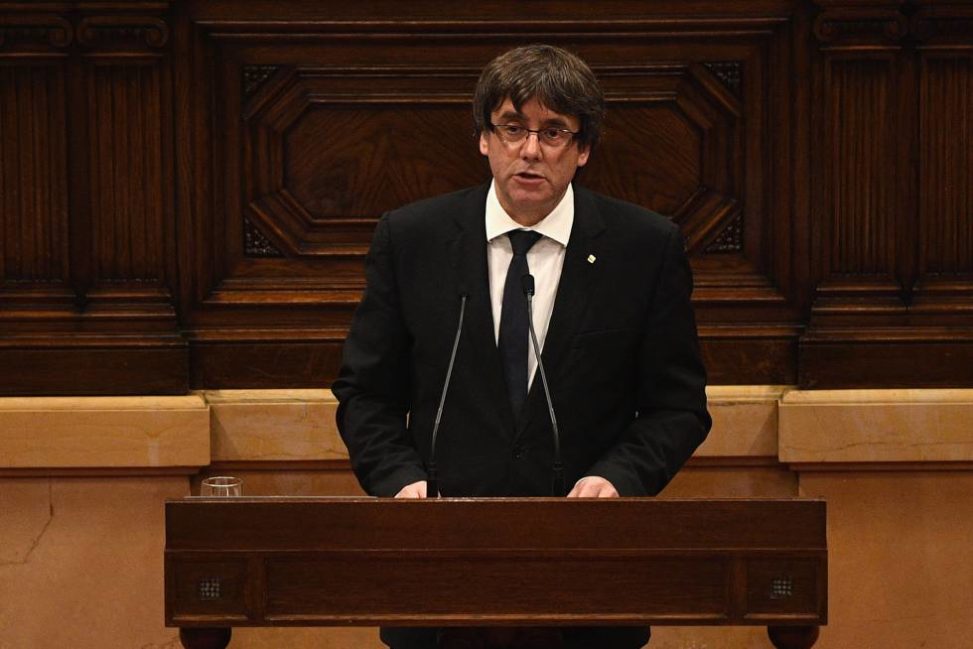On Tuesday, Catalan President Carles Puigemont and majority regional parliamentarians declared independence from Spain – then suspended it to pursue dialogue with Madrid.
The document signed said in part:
“We establish the Catalan Republic as an independent and sovereign, legal, democratic and social state.”
“Catalonia restores today its full sovereignty, lost and longed for, after decades of trying, honestly and loyally, institutional coexistence with the people of the Iberian Peninsula.”
“In spite of the violence and the repression to try to prevent a democratic and peaceful process, the citizens of Catalonia have voted mostly in favor of the constitution of the Catalan Republic.”
“The constitution of the Catalan Republic is based on the need to protect the freedom, security and coexistence of all citizens of Catalonia and to move towards a state of law and a democracy of greater quality, and respond to the impediment by Spain to enforce the right to self-determination of peoples.”
“The Catalan state will comply with and will legally comply with all the provisions that make up this declaration and ensures that the legal security and maintenance of the subscribed agreements will be part of the founding spirit of the Catalan Republic.”
“The Catalan Republic is an opportunity to correct the current democratic and social deficits and build a more prosperous, fairer, more secure, more sustainable and more supportive society.”
“WE AFFIRMING the will to open negotiations with Spain, without any previous conditions, aimed at establishing a collaboration system for the benefit of both parties. The negotiations must necessarily be on an equal footing.”
“I APPEAL to the States and international organizations to recognize the Catalan Republic as an independent and sovereign State.”
By declaring, then suspending, independence it’s yet to come into force. Launching the founding process indicates this is where Catalonia is heading – for sure facing stiff opposition from Madrid, unbending on this issue.
Meaningful dialogue is unlikely. If talks are held, Catalan officials will face demands, not concessions beyond little more than status quo conditions.
Spanish PM Mariano Rajoy said Catalonia’s declaration of independence “will have no effect.”
Deputy PM Soraya Saenz de Santamaria said “(n)either Mr. Puigdemont nor anybody else can claim…to impose mediation.”
On Wednesday, Madrid officials will meet to decide their next move.
Pro-independence CUP parliamentarians expressed strong opposition to Puigdemont’s suspension.
Socialist Party leader Miquel Iceta said “(y)ou can’t suspend a declaration of independence you haven’t made. It’s an insult to common sense.”
Tuesday’s declaration has no legal force so far. Catalan MPs will formally vote on it if talks with Madrid fail or don’t take place.
In his Tuesday address to parliament and millions of Catalans, Puigdemont said he’s obligated to execute the will of the people – delaying independence to pursue dialogue with Madrid, urging EU involvement.
Catalans overwhelmingly want independence from fascist Spain, sovereignty they’ve sought for hundreds of years.
Puigdemont and majority parliamentarians support them. Formally declaring independence appears just a matter of time.
Given unbending Madrid opposition, enforcing it is another matter entirely, especially with no world community support.
A Final Comment
On Monday, eight Nobel Peace laureates sent an open letter to Madrid and Catalan leaders, ccing the European Commission, urging mediation and negotiations toward resolving things peacefully.
They denounced Madrid-sponsored referendum day violence. While taking no position on constitutional issues, they explained separatist referendums were conducted peacefully in Scotland, Quebec and elsewhere.
“A people who feel repressed seldom go quietly into the night,” they stressed.
Signed:
Jody Williams, Nobel Peace Prize (1997)
Mairead Maguire, Nobel Peace Prize (1976)
Betty Williams, Nobel Peace Prize (1976)
Adolfo Perez Esquivel, Nobel Peace Prize (1980)
Rigoberta Menchu Tum, Nobel Peace Prize (1982)
President Jose Ramos Horta, Nobel Peace Prize (1996)
Shirin Ebadi, Nobel Peace Prize (2003)
Tawakkol Karman, Nobel Peace Prize (2011)
